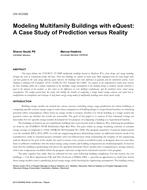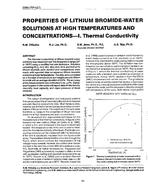The objective of this study was to define net space-heating demands of various houses so that the global coefficients of performance of their heating systems can be determined on the basis of their real consumption.
An experimental audit was performed during the winter of 1982-83 on 15 houses. A coheating test was carried out for one week in each house, with daily temperature set points fixed room by room and with night cutoff of all heating sources.
Indoor and outdoor microclimates were monitored at the same time as electrical consumption and occupancy heat gains. Infiltration losses were estimated separately on the basis of pressurization and tracer-gas experiments.
Two examples are presented in this paper:
- A semidetached masonry house with significant indoor partitioning (a very common house type in western Europe);
- A wood-frame bungalow (more typical of North American buildings).
Results of the measurements are first averaged over time and analyzed to produce a multizone static building model. The time variations are then taken into account to check the accuracy of a complete multizone dynamic model. The dynamic model is used to generate a simplified model that will be used to further analyze the performance of the heating systems.
Citation: Symposium Papers, Atlanta, GA, 1984
Product Details
- Published:
- 1984
- Number of Pages:
- 15
- File Size:
- 1 file , 1000 KB
- Product Code(s):
- D-AT-84-02-3


